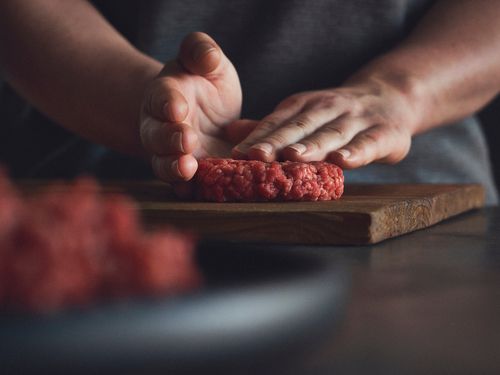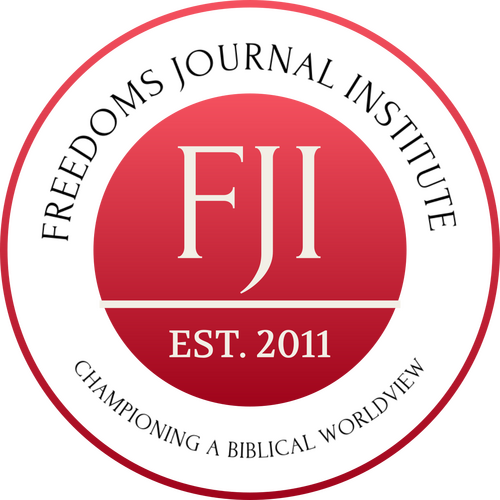Where's the Beef?

By John Stossel
How can it be that with so much cattle in America, we sometimes can't buy meat?
At the beginning of the pandemic, Costco, Wegmans and Kroger limited purchases of beef. Hundreds of Wendy's outlets ran out of hamburgers.
"How the hell can this be?" says Rep. Thomas Massie, R-Ky., in my new video. "They (Wendy's) were out of hamburger, yet you could see cattle from the drive-thru!"
It happens because of stupid government rules.
Massie owns a small farm in Kentucky. "I'd rather deal with cattle than congressmen," he jokes. "At least (cattle) exhibit learned behavior."
But politicians often don't.
"You're born with the right to eat what you want," says Massie. "Why is the government getting in the middle and saying, 'No, you can't buy that'?"
"To keep you safe," I push back.
"They're not keeping you safe," Massie responds. "They're keeping you away from good, healthy food."
American meat regulation began after activist Upton Sinclair worked undercover at a meatpacking plant and then wrote the book "The Jungle." It became a huge bestseller. Sinclair's goal was to advance socialism. But his book became famous for exposing unsanitary conditions, like rat infestations and rotting meat carcasses, at packing plants.
The outcry over that led Congress in 1906 to declare that any meat sold must get a stamp of approval from the United States Department of Agriculture.
What did the inspection entail? An absurd technique called "poke and sniff." To find tainted meat, federal bureaucrats stuck little spikes into carcasses and then smelled the spikes.
If they smelled something spoiled, they ordered that meat discarded.
The process was ridiculous. The inspectors used the same spikes over and over, plunging them into multiple animals. Poking and sniffing sometimes made things worse by spreading disease from one carcass to the next.
Of course, governments often do ridiculous things, and regulators, once they start doing them, keep doing them. The feds didn't stop "poke and sniff" until the late 1990s.
Today, USDA inspectors do a better job. They test for bacteria. But the inspection process is so cumbersome and expensive, many small companies can't afford it.
The result, complained President Joe Biden recently, is too much market concentration: "Four big corporations control more than half the markets in beef, pork and poultry!"
His remedy, sadly, is to give your tax money to some smaller meatpackers.
Of course, such subsidies and regulations increase market concentration.
"The bigger the government, the bigger the corporations," Massie points out. "People who don't like big corporations haven't figured that out."
During the beginning of the pandemic, it was that market concentration that caused meat shortages when a few big meat processing plants shut down due to COVID infections.
"We made our food supply brittle," says Massie. "One small disruption throws the whole thing off."
When the processors shut down, some ranchers who couldn't get to a federally approved slaughterhouse ended up killing their own animals. If only they'd been able to go to a local processor.
Massie takes his cattle to one. There, he can see the conditions himself. His local slaughterhouse meets state inspection standards.
But since it is not USDA-certified, Massie and other ranchers who have their cattle processed there may not sell you a steak. He can, however, give it to you or eat it himself. But he may not sell it.
To fix that, Massie proposes a new law: the PRIME Act, which would let farmers sell meat processed by state-approved slaughterhouses, with no federal meddling.
"You're self-dealing," I tell him. "Just trying to help yourself."
"I've got 50 cattle," he replies. "This is the most inefficient self-dealing any politician has ever engaged in."
Massie says he's doing it because Americans ought to have a right to eat whatever we want to buy.
"It boggles my mind why Washington, D.C., needs to be involved in a transaction between me ... and a customer who's my neighbor."
[John Stossel is creator of Stossel TV and author of "Give Me a Break: How I Exposed Hucksters, Cheats, and Scam Artists and Became the Scourge of the Liberal Media." For other Creators Syndicate writers and cartoonists, visit www.creators.com]
How can it be that with so much cattle in America, we sometimes can't buy meat?
At the beginning of the pandemic, Costco, Wegmans and Kroger limited purchases of beef. Hundreds of Wendy's outlets ran out of hamburgers.
"How the hell can this be?" says Rep. Thomas Massie, R-Ky., in my new video. "They (Wendy's) were out of hamburger, yet you could see cattle from the drive-thru!"
It happens because of stupid government rules.
Massie owns a small farm in Kentucky. "I'd rather deal with cattle than congressmen," he jokes. "At least (cattle) exhibit learned behavior."
But politicians often don't.
"You're born with the right to eat what you want," says Massie. "Why is the government getting in the middle and saying, 'No, you can't buy that'?"
"To keep you safe," I push back.
"They're not keeping you safe," Massie responds. "They're keeping you away from good, healthy food."
American meat regulation began after activist Upton Sinclair worked undercover at a meatpacking plant and then wrote the book "The Jungle." It became a huge bestseller. Sinclair's goal was to advance socialism. But his book became famous for exposing unsanitary conditions, like rat infestations and rotting meat carcasses, at packing plants.
The outcry over that led Congress in 1906 to declare that any meat sold must get a stamp of approval from the United States Department of Agriculture.
What did the inspection entail? An absurd technique called "poke and sniff." To find tainted meat, federal bureaucrats stuck little spikes into carcasses and then smelled the spikes.
If they smelled something spoiled, they ordered that meat discarded.
The process was ridiculous. The inspectors used the same spikes over and over, plunging them into multiple animals. Poking and sniffing sometimes made things worse by spreading disease from one carcass to the next.
Of course, governments often do ridiculous things, and regulators, once they start doing them, keep doing them. The feds didn't stop "poke and sniff" until the late 1990s.
Today, USDA inspectors do a better job. They test for bacteria. But the inspection process is so cumbersome and expensive, many small companies can't afford it.
The result, complained President Joe Biden recently, is too much market concentration: "Four big corporations control more than half the markets in beef, pork and poultry!"
His remedy, sadly, is to give your tax money to some smaller meatpackers.
Of course, such subsidies and regulations increase market concentration.
"The bigger the government, the bigger the corporations," Massie points out. "People who don't like big corporations haven't figured that out."
During the beginning of the pandemic, it was that market concentration that caused meat shortages when a few big meat processing plants shut down due to COVID infections.
"We made our food supply brittle," says Massie. "One small disruption throws the whole thing off."
When the processors shut down, some ranchers who couldn't get to a federally approved slaughterhouse ended up killing their own animals. If only they'd been able to go to a local processor.
Massie takes his cattle to one. There, he can see the conditions himself. His local slaughterhouse meets state inspection standards.
But since it is not USDA-certified, Massie and other ranchers who have their cattle processed there may not sell you a steak. He can, however, give it to you or eat it himself. But he may not sell it.
To fix that, Massie proposes a new law: the PRIME Act, which would let farmers sell meat processed by state-approved slaughterhouses, with no federal meddling.
"You're self-dealing," I tell him. "Just trying to help yourself."
"I've got 50 cattle," he replies. "This is the most inefficient self-dealing any politician has ever engaged in."
Massie says he's doing it because Americans ought to have a right to eat whatever we want to buy.
"It boggles my mind why Washington, D.C., needs to be involved in a transaction between me ... and a customer who's my neighbor."
[John Stossel is creator of Stossel TV and author of "Give Me a Break: How I Exposed Hucksters, Cheats, and Scam Artists and Became the Scourge of the Liberal Media." For other Creators Syndicate writers and cartoonists, visit www.creators.com]
Posted in Opinion
Posted in John Stossel, Beef, Covid-19, Big government, American Meat, Farmers, President Joe Biden, Markets, Meat processing, #freedomsjournalmagazine, Freedoms Journal Institute, USDA, PRIME Act
Posted in John Stossel, Beef, Covid-19, Big government, American Meat, Farmers, President Joe Biden, Markets, Meat processing, #freedomsjournalmagazine, Freedoms Journal Institute, USDA, PRIME Act
Recent
The Heart of the Matter Is the Matter of the Heart
February 14th, 2026
People of Color can also steal…Duh?
February 14th, 2026
The Monroe Doctrine Isn’t Outdated — It’s Vital for American Security
January 5th, 2026
Defining Racism “UP”
January 4th, 2026
The Voting Rights Act Should Protect Voting—Not Perpetuate Fear
January 4th, 2026
Archive
2026
2025
February
March
July
September
October
November
2024
January
Cartoon 01/01/24Cartoon 01/02/24Claudine Gay Betrayed the American Values of My Black Elders to Exploit White GuiltCartoon 01/03/24Cartoon 01/05/24Cartoon 01/06/24Cartoon 01/07/24Cartoon 01/08/24We need a David, not a SaulCartoon 01/13/24Cartoon 01/09/24Cartoon 01/10/24Cartoon 01/11/24Cartoon 01/14/24Cartoon 01/12/24What Happens to a King Deferred? A ReduxCartoon 01/15/24Cartoon 01/16/24The Good Guys with Guns Part 1Cartoon 01/17/24America Works. DEI Doesn’t.Cartoon 01/18/24Cartoon 01/23/24Good Guys with Guns Part 2Cartoon 01/19/24Cartoon 01/21/24Cartoon 01/22/24Cartoon 01/24/24Cartoon 01/26/24Cartoon 01/25/24Cartoon 01/27/24
February
Cartoon 02/04/24Cartoon 02/03/24Cartoon 02/02/24Cartoon 02/01/24Cartoon 01/31/24Cartoon 01/28/24Cartoon 01/29/24We’ve Been Gay(ed) Part 1Cartoon 02/05/24Cartoon 02/06/24Cartoon 02/07/24Cartoon 02/08/24Cartoon 02/13/24Cartoon 02/12/24Cartoon 02/09/24Cartoon 02/11/24Cartoon 02/10/24Cartoon 02/19/24'Black America at Crossroads’ of Culture Wars as Presidential Election LoomsWe’ve Been Gay(ed) Part 2Cartoon 02/18/24Cartoon 02/17/24Cartoon 02/16/24Cartoon 02/15/24Cartoon 02/14/24Cartoon 02/22/24Cartoon 02/21/24Cartoon 02/20/24America Needs a “Black Wives Matter” Movement To Rebuild the Black FamilyCartoon 02/23/24Cartoon 02/24/24Cartoon 02/25/24Cartoon 02/26/24Cartoon 02/27/24

No Comments